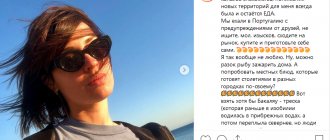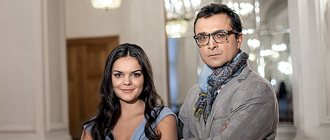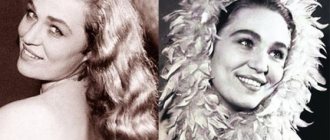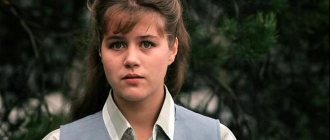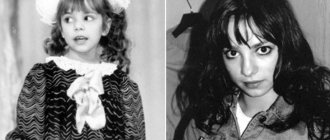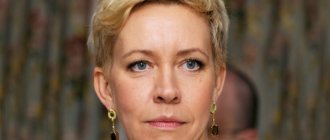| Svetlana Lazareva | |
Svetlana Lazareva at the Central Committee of Culture and Music of Severodvinsk (2013) | |
| basic information | |
| Full name | Svetlana Yurievna Lazareva |
| Date of Birth | April 24, 1962(1962-04-24) (age 58) |
| Place of Birth | Verkhniy Ufaley, Chelyabinsk region, USSR |
| A country | Russia |
| Professions | singer, TV presenter |
| Genres | pop |
| Teams | Blue Bird, Women's Council |
| Awards | || |
| [www.svetlana-lazareva.ru Official website of Svetlana Lazareva ] | |
Wikipedia has articles about other people with the last name Lazarev.
Svetlana Yurievna Lazareva
(April 24, 1962, Verkhny Ufaley, Chelyabinsk region) - Soviet and Russian pop singer.
Biography
Born on April 24, 1962 in the city of Verkhny Ufaley, Chelyabinsk region.
After graduating from high school, she worked as a singer in the Krasnodar Philharmonic. On the recommendation of the composer Theodor Efimov, she became a soloist of the Blue Bird VIA, where she worked from 1983 to 1989. From this period of Lazareva’s work, listeners remembered her dramaturgically rich song “Edith Piaf - Little Sparrow.”
At the television pop song festival “Jurmala-88” he meets Lada Volkova (Dance) and Alena Vitebskaya. The result of the acquaintance is the creation of the vocal trio “Women's Council”.
Since 1990, after leaving the Women's Council, Svetlana has had a solo career. The first solo disc entitled “Let's get married!” is released.
The second album “Telnyashka” (1994) is radically different from the debut, almost entirely consisting of “restaurant hits”. Nevertheless, the album is a success.
Lyrics in Lazareva’s work return in the third album “The ABC of Love” (1995).
Svetlana Lazareva works as a TV presenter together with Ilona Bronevitskaya in the musical entertainment program Morning Mail.
In the summer of 1998, he organized his own music center, which brings together young composers.
On October 30, 2006, the only concert “The Golden Voices of the Blue Bird” took place in St. Petersburg: Sergei Drozdov (1955-2012), Sergei Levkin (1951-2006), Svetlana Lazareva.
She continues to give solo concerts and participates in national teams; in addition, she has many patron concerts in nursing homes and women's colonies.[1] Presenter of the “Live Broadcast” program on the Musicbox Russia TV channel.
Personal life
After graduating from university, Svetlana Lazareva got married for the first time. She became the wife of an engineer by training, songwriter Simon Osiashvili, who at that time collaborated with VIA Blue Bird. The marriage did not last long and broke up due to the husband's reluctance to have children.
After the divorce, Osiashvili married for the second time, this time to Tatyana Lukina. The man helped her son from a previous relationship with his studies, but the young man did not appreciate it. Nevertheless, Simon tried to build a trusting relationship with his wife, so he was very surprised when he woke up one night and did not find his wife next to him. Her search led the man to the bathroom, where he saw Tatyana’s body - Lukina had committed suicide. A new relationship with Tatyana Koropovskaya helped him survive the tragedy.
Svetlana Lazareva and Valery Kuzmin (still from the program “While everyone is at home”)
Svetlana met her second chosen one, Valery Kuzmin, in adulthood. The long-awaited meeting, which changed the artist’s personal life, took place after the singer visited the Sretensky Monastery. Soon after meeting Valery, Lazareva found out that she was pregnant.
Daughter Natalya was born when the artist was 34 years old. The girl received her name in honor of Svetlana’s friend Natalya Vetlitskaya, who became the newborn’s godmother. The birth was difficult; the singer spent nine days after the operation in intensive care. After the birth of their daughter, the Lazareva family settled in the small town of Bronnitsy near Moscow.
After 19 years of marriage, Svetlana and Valery decided to divorce. The artist left all the jointly acquired property to her wife. Daughter Natalya Kuzmina, who turned 18 at that time, was having a hard time with her parents’ divorce. She studied at the university at the Faculty of Journalism. For herself and her daughter, Svetlana Lazareva purchased a townhouse in New Riga.
According to the artist, the decision to leave her husband, for whom the woman sacrificed her career and fame, was difficult. Lazareva cannot call herself the darling of fate. During the years of her life together with Kuzmin, she independently made expensive purchases in the form of jewelry, cars, fur coats and other things, her husband did not help her with this.
View this post on Instagram
A post shared by Svetlana Lazareva (@svetlanalazareva62) on Dec 9, 2020 at 12:04am PST
Svetlana Lazareva with her daughter
In her youth, as in her mature years, Svetlana had an attractive appearance, for which she always enjoyed the attention of men. Now, with a height of 170 cm, her weight is 60 kg.
Like many modern women, Lazareva maintains a page on Instagram, where she publishes personal photos, and also presents new works, invites fans to concerts and posts videos and pictures from past events.
On social networks, the artist often communicates with subscribers, however, the woman admits that she answers only reasonable questions and only to those in whom she sees an interest. She takes constructive criticism positively and does not pay attention to groundless insults.
Most famous songs
- "The ABC of Love";
- 1997 — “Watercolor”
- "Saucers";
- "Come back home";
- "Sing Guitar";
- "Let's get married";
- "Yellow Boats";
- "Treason";
- "Cinema";
- "Cleopatra";
- 1995 - “The Shop”;
- "Love me";
- 1996 - “Mom”;
- "My stranger";
- "Really";
- "Remember me";
- "Under the sign of Taurus";
- "Knock on Wood";
- “I escorted the boy to the army”;
- "Singing bird";
- "Tell me, captain";
- 1994 - “Vest”;
- “You are not Gagarin”;
- “Kissing someone else”;
Discography
- 1990 “Let's get married”
[6]
- Let's get married
- Wet snow
- Cur
- Yellow boats
- Choose
- Your words are worthless
- Devilry
- Snow White
- Don't scold me mom
- Tell me, captain
- Waiting for you
- 1994 “Vest”
- Vest
- Come back home
- Under the sign of Taurus
- remember me
- My stranger
- Knock on wood
- Choose
- Your words are worthless
- Go all fours
- Wet snow
- Love me
- I escorted the boy to the army
- Don't scold me, mom!
- Yellow boats
- 1995 “The ABC of Love”
- Bench
- Guitar Sing
- Mother
- Saucers
- ABC of Love
- Kiss
- Treason
- They say
- Cinema
- Kissing Another
- Mirror
- Singing bird
- 1998 "Watercolor"
- Watercolor
- Tell me the truth
- Triangle
- Do not be silent
- Hangover of love
- Shura - fisherman
- Hugs and kisses
- I didn't expect it myself
- Red rowan
- Cleopatra
- 2001 “I’m so different”
- Really
- Showers
- It's you
- Parting
- You are not Gagarin
- Where are you now
- Get used to it
- She Was Herself
- Autumn
- Night
- Give
- Meeting and Parting
- 2002 “Names for all times”
- Vest
- Come back home
- Love me
- Don't scold me mom
- Bench
- Singing bird
- You are not Gagarin
- Kissing someone else
- My stranger
- Mother
- Under the sign of Taurus
- Really
- Treason
- Guitar sing
- Let's get married
[7]
Music
After school, Svetlana went to Moscow, where she entered GITIS to major in mass production. Already in her first year, the girl got a job at the Philharmonic, where she captivated the leaders with her jazz style of singing. At one of the concerts, Svetlana met the Soviet composer Theodor Efimov, who advised his musician friends from the Blue Bird group - Yuri Metelkin, Mikhail and Robert Bolotny - to pay attention to the young vocalist.
VIA "Blue Bird" was organized on the territory of Belarus back in the early 70s. As their popularity grew, the musicians moved to the RSFSR, to the city of Gorky. By the time Svetlana Lazareva joined the group, 4 studio albums had already been recorded: “Mom’s Record”, “From Heart to Heart”, “Alone with Myself”, “My Love Is Alive”.
In the 80s, the VIA “Blue Bird” included vocalists, Nina Costa,. He worked as a sound engineer. The team performed at international festivals in Bulgaria, Moscow, and toured Afghanistan, Tanzania, Kenya, Ethiopia, Angola, Vietnam, Laos, and Kampuchea. Vocalist Svetlana Lazareva was awarded the Order of Friendship in Vietnam and Lebanon.
Svetlana Lazareva and VIA “Blue Bird”
In 1988, while performing at an international festival in Jurmala, Svetlana met young performers and Alena Vitebskaya. Soon Lazareva left Blue Bird for a new project - the Zhensovet trio. In 1990, a new era began in the creative biography of Svetlana Lazareva: the singer began a solo career. The artist’s first album, “Let’s Get Married,” which included the songs “Yellow Boats,” “Wet Snow,” “Choose,” “Waiting for You,” gained all-Russian fame.
Svetlana Lazareva and the Zhensovet trio
The singer’s second disc, “Telnyashka,” appeared four years after the first. It included tracks that sounded close to restaurant music - “Go to all four directions”, “I saw the boy off to the army”, “Your words are worthless.” A year later, Svetlana released the third collection “The ABC of Love”, which included musical compositions of a predominantly lyrical nature - “Sing Guitar”, “Bench”, “Mom” (known as “Mom, you are my godmother”), “Kiss” .
In the mid-90s, the popular singer was invited to work as a presenter on television. Together with Ilona Bronevitskaya, Svetlana Lazareva hosted the program “Morning Mail” for several seasons. In 1998, the singer headed a production center, under whose roof young composers and performers gathered. In the same year, the artist pleased her fans with new songs from her fourth album “Watercolor” - “Tell me the truth”, “I’ll hug and kiss”, “Hangover of Love”.
Unlike her colleagues, Svetlana Lazareva rarely created video clips for her hits; she only recorded videos from her concerts. Nevertheless, in the early 2000s, the artist released a video for the song “Mama.” In 2001, the next studio album “I’m So Different” appeared, which included the tracks “Really”, “Showers”, “She was herself”, “Autumn”. A year later, the artist released the collection “Names for All Seasons” with hits of past years and new musical compositions “Come Home”, “Love Me”, “My Stranger”.
Since the mid-2000s, Svetlana has gone into the shadows. The singer devoted herself to her family, occasionally performing solo. In 2006, Svetlana Lazareva took part in the concert of the Blue Bird group “Golden Voices”. The artist appeared on stage accompanied by former members of the group - Sergei Drozdov and Sergei Levkin. In 2006, Lazareva received the Order of Friendship of Peoples, and a year later - the Silver Order “For Contribution to Art.”
In April 2014, former soloists of the Blue Bird VIA repeated the combined concert of former members of the ensemble. The performance took place at the Mir Theater and Concert Hall on Tsvetnoy Boulevard. Yuri Antonov, Igor Sarukhanov, Svetlana Lazareva and other musicians performed songs from the 70s and 80s - “I Don’t Dream of You”, “Where the Maple Tree Noises”, “So That’s What You Are”, “White Ship”, “ I’m coming to meet you,” “Bitter,” “Hello, how are you living,” “Mom’s record,” “You’re hurting love now.”
Notes
- ↑ 12
[teleweek.ru/16145 Teleweek Svetlana Lazareva: if my husband finds a young woman, I’ll shoot her!] - [lichnaya-zhizn.ru/blog/svetlana_lazareva_lichnaja_zhizn/2013-09-18-39 Svetlana Lazareva: personal life]
- [www.svetlana-lazareva.ru/publications/page3.html Svetlana Lazareva - With the birth of my daughter, my whole life changed]
- ↑ 12
[www.svetlana-lazareva.ru/publications/page1.html Svetlana Lazareva - Not a fictitious name] - [www.svetlana-lazareva.ru/biography.html Svetlana Lazareva - Biography]
- [find-album.ru/41377-svetlana-lazareva-davaj-pozhenimsya-1990.html Svetlana Lazareva - Let's get married (1990)]
- [www.svetlana-lazareva.ru/discography.html Svetlana Lazareva - Discography]
Childhood and family of Svetlana Lazareva
Svetlana Lazareva was born on April 24, 1962 in the small provincial town of Verkhny Ufaley (Chelyabinsk region).
In this place, our today's heroine spent her entire childhood and youth. There she began to sing for the first time and dream of a career as a pop artist. Sveta's path to musical creativity was quite ordinary. At first she organized mini-concerts for her acquaintances and friends, and then she also began studying vocals at a music school. Working on herself, the girl achieved considerable success, and this did not escape the sensitive gaze of professional teachers. The girl was often invited to various school and youth concerts. Thus, already in adolescence, Svetlana Lazareva began to often perform on stage.
An excerpt characterizing Lazarev, Svetlana Yurievna
“It doesn’t matter now,” Pierre said involuntarily. “Eh, you’re a dear man,” Plato objected. - Never give up money or prison. “He sat down better and cleared his throat, apparently preparing for a long story. “So, my dear friend, I was still living at home,” he began. “Our patrimony is rich, there is a lot of land, the men live well, and our home, thank God.” The priest himself went out to mow. We lived well. They were real Christians. It happened... - And Platon Karataev told a long story about how he went to someone else’s grove behind the forest and was caught by a guard, how he was whipped, tried and handed over to the soldiers. “Well, the falcon,” he said, his voice changing with a smile, “they thought grief, but joy!” My brother should go, if it were not for my sin. And the younger brother has five boys himself - and look, I have only one soldier left. There was a girl, and God took care of her even before she became a soldier. I came on leave, I’ll tell you. I see they live better than before. The yard is full of bellies, women are at home, two brothers are at work. Only Mikhailo, the youngest, is at home. Father says: “All children are equal to me: no matter what finger you bite, everything hurts. If only Plato hadn’t been shaved then, Mikhail would have gone.” He called us all - believe me - he put us in front of the image. Mikhailo, he says, come here, bow at his feet, and you, woman, bow, and your grandchildren bow. Got it? speaks. So, my dear friend. Rock is looking for his head. And we judge everything: sometimes it’s not good, sometimes it’s not okay. Our happiness, my friend, is like water in delirium: if you pull it, it swells, but if you pull it out, there’s nothing. So that. - And Plato sat down on his straw. After being silent for some time, Plato stood up. - Well, I have tea, do you want to sleep? - he said and quickly began to cross himself, saying: “Lord, Jesus Christ, St. Nicholas, Frol and Lavra, Lord Jesus Christ, St. Nicholas!” Frol and Lavra, Lord Jesus Christ - have mercy and save us! - he concluded, bowed to the ground, stood up and, sighing, sat down on his straw. - That's it. “Put it down, God, like a pebble, lift it up like a ball,” he said and lay down, pulling on his greatcoat. -What prayer were you reading? – asked Pierre. - Ass? - said Plato (he was already falling asleep). - Read what? I prayed to God. Don’t you ever pray? “No, and I pray,” said Pierre. - But what did you say: Frol and Lavra? “But what about,” Plato quickly answered, “a horse festival.” And we must feel sorry for the livestock,” Karataev said. - Look, the rogue has curled up. She got warm, the son of a bitch,” he said, feeling the dog at his feet, and, turning around again, immediately fell asleep. Outside, crying and screams could be heard somewhere in the distance, and fire could be seen through the cracks of the booth; but in the booth it was quiet and dark. Pierre did not sleep for a long time and, with open eyes, lay in his place in the darkness, listening to the measured snoring of Plato, who lay next to him, and felt that the previously destroyed world was now being erected in his soul with new beauty, on some new and unshakable foundations. In the booth into which Pierre entered and in which he stayed for four weeks, there were twenty-three captured soldiers, three officers and two officials. All of them then appeared to Pierre as if in a fog, but Platon Karataev remained forever in Pierre’s soul as the strongest and dearest memory and personification of everything Russian, kind and round. When the next day, at dawn, Pierre saw his neighbor, the first impression of something round was completely confirmed: the whole figure of Plato in his French overcoat belted with a rope, in a cap and bast shoes, was round, his head was completely round, his back, chest, shoulders, even the hands that he carried, as if always about to hug something, were round; a pleasant smile and large brown gentle eyes were round. Platon Karataev must have been over fifty years old, judging by his stories about the campaigns in which he participated as a long-time soldier. He himself did not know and could not determine in any way how old he was; but his teeth, bright white and strong, which kept rolling out in their two semicircles when he laughed (which he often did), were all good and intact; There was not a single gray hair in his beard or hair, and his whole body had the appearance of flexibility and, especially, hardness and endurance. His face, despite the small round wrinkles, had an expression of innocence and youth; his voice was pleasant and melodious. But the main feature of his speech was its spontaneity and argument. He apparently never thought about what he said and what he would say; and because of this, the speed and fidelity of his intonations had a special irresistible persuasiveness. His physical strength and agility were such during the first time of captivity that it seemed that he did not understand what fatigue and illness were. Every day, in the morning and in the evening, when he lay down, he said: “Lord, lay it down like a pebble, lift it up into a ball”; in the morning, getting up, always shrugging his shoulders in the same way, he said: “I lay down and curled up, got up and shook myself.” And indeed, as soon as he lay down, he immediately fell asleep like a stone, and as soon as he shook himself, he immediately, without a second of delay, took up some task, like children, getting up, taking up their toys. He knew how to do everything, not very well, but not badly either. He baked, steamed, sewed, planed, and made boots. He was always busy and only at night allowed himself conversations, which he loved, and songs. He sang songs, not as songwriters sing, who know that they are being listened to, but he sang like birds sing, obviously because he needed to make these sounds just as it is necessary to stretch or disperse; and these sounds were always subtle, gentle, almost feminine, mournful, and at the same time his face was very serious. Having been captured and grown a beard, he apparently threw away everything alien and soldierly that had been imposed on him and involuntarily returned to his former, peasant, folk mindset.
Star Trek of singer Svetlana Lazareva
Our today’s heroine joined VIA “Blue Bird” already in 1983.
It was in this musical ensemble that Svetlana Lazareva grew up and improved as an artist. The team was successful, however, as music historians noted, when performing as part of the Blue Bird, the young vocalist was always under the harsh pressure of Soviet censorship, and therefore it could not be fully called real creativity. Svetlana Lazareva - “Mama”
The situation became even more serious when the VIA group “Blue Bird” began to tour outside the Soviet Union. During this period, the group became very popular in some socialist countries and subsequently even received national awards in Vietnam, Lebanon and a number of other countries ideologically close to the USSR. Thus, VIA “Blue Bird” became a kind of calling card of the Soviet Union. Therefore, the ideological pressure on her increased even more.
Feeling this, at a certain moment Svetlana Lazareva decided to leave the team. And as a result, already in 1988, she created her own group - “Women’s Council”. The formation of the first “girls-band” in the USSR took place immediately after the end of the music festival in Jurmala, during which our today’s heroine met two other young pop singers Alena Vitebskaya and Lada Dance. Together they decided to organize a trio, which, in fact, received the name “Women’s Council”. This project sang more fun and fiery songs than “Blue Bird”, and was also distinguished by its irrepressible energy and the use of rather unusual outfits during its performances.
Svetlana Lazareva - Telnyashka
As a result, the Zhensovet group became a kind of flash on the stage of the collapsing Soviet Union. The brazen and eccentric girls were “a product of their time,” and therefore the popularity of the group was rather fleeting. Already in the late nineties, the group began to burst at the seams, and therefore very quickly broke up. Each of the participants began their own musical career. And Svetlana Lazareva was no exception to the rule.

